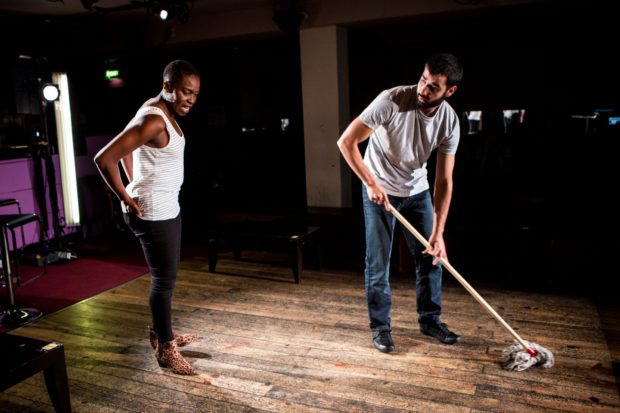You have no items in your cart. Want to get some nice things?
Go shopping
While the Bush Theatre undergoes a multi-million pound redevelopment, a new season makes a virtue of necessity. With This Place We Know, the Bush has put on a collection of new plays and dispersed them across a variety of unorthodox nearby locations.
Stripped of a residence for the better part of a year, the idea to source non-traditional performance venues close by is laudable: the locations vary from disused Walkabout pubs to grotty dive bars adorned in fluorescent fairy lights. With endless potential to make substantial comments on the local area, it is saddening that the double bill appeared unconcerned with its surroundings. What could have been a real opportunity to connect with historical buildings or local stories merely includes throwaway references to road names.
The Bush is building a second studio space, which would undoubtedly be bolstered by a firmer connection with local residents ensuring a sustainable local audience. The capital is experiencing a surge of new smaller venues, from the Bunker Theatre, Donmar Warehouse and Underbelly, causing The Stage writer Mark Shenton to query their use in his recent article – a sentiment also echoed by A Younger Theatre founder Jake Orr on his own website. The survival and progression of theatre is not in sourcing new space, but in building new audiences and it’s questionable whether the latest foray from the Bush Theatre achieves this.
The first play of the evening is the misleadingly titled Terrorism, which depicts two married individuals who rent a west London flat together to share time away from their families. A list of rules is created in order for the arrangement to be successful. They intend to rebel against the normal monogamous relationships and are convinced that a more fulfilling model can exist. They approach their affair like a business deal, each laying out the terms and conditions of their involvement. Both are adamant that their lives outside of this arrangement can remain unchanged. Kenny Emson’s play is taut and jocular. The two-hander explores the trials of modern needs in a society that insists on being faithful to certain modes of decorum. David and Nadia are played by Trevor White and Eleanor Matsuura, a couple in real life, who unsurprisingly share an electric chemistry on stage. Though passionate, there is also a sense from the outset that their coolness will not last. Trickles of their regular existence start to enter into their shared space and stories of sick children, and tales of exhausting work tribulations start to infiltrate. Normalcy starts to infiltrate and slowly begins to break down their façade. Eleanor Rhode’s sharp direction illuminates the breakdown carefully and urges the pair to admit that purposefully fragmenting a life will cause significant ruptures. The play is a powerful exploration of what it means to be faithful and what it means to be fulfilled.
Had Terrorism been presented as a singular piece of theatre then it could be praised for its merit alone. However, within this context, it raises the question: how does this play help us connect with Shepherd’s Bush?
The second piece of the evening is a mere three minutes’ walk away. Barney Norris’s The Rest of Your Life is hosted at Bar FM, a dingy bar seconds from Uxbridge Road. There are similarities between Norris’ work and Emson’s. Both depict individuals of opposing genders whose identities are carefully crafted, splitting themselves into different personas to assimilate to new environments. In Bar FM, employee Nick (Waj Ali) is trying to cash up the till as a stranger enters. Hannah (Rakie Ayola) claims to only want a cup of coffee but her persistent questions hint at something more sinister. She is a visitor from his past, come to ensure that he remains silent about long buried activities. Tonally, Miranda Cromwell’s direction is unbalanced: the to and fro between the two characters is not tight enough to remain compelling. Hannah professes herself to be like a wild cat hunting down her prey, but the ritual is upset by frequent bursts of emotions that are too large for the intimate setting. Instead of being a calculated hunting procedure, it becomes messy with heightened feeling.
The evening brought a presentation of two well-constructed new plays, but given the venues one can’t help but search for greater meaning. The collection feels artist-led, but there’s also a sense that no grander purpose was achieved. It’s as if the locations have been wholly ignored other than offering the practical advantage of alternative space. It’s fascinating that the Bush was able to acquire six different venues near the green. Each must have a history and unique connection to the locales. But they remain relatively untapped resources.
Thanks to a partnership with Westfield, the Bush was able to offer 20% of tickets to This Place We Know for free to locals, a brilliant way of encouraging locals to come and watch. But with such a suggestive title to the collection, it seems a shame that locals weren’t involved in the creative process. Heralded as a “love-letter” to their home, with each story being woven into the fabric of the city, somehow this feels like a strong claim for what was actually presented.
This Place We Know runs until Saturday Oct 15. For more information, visit the Bush Theatre website.

About Rebecca Latham
Graduating from Sydney University in 2012, Rebecca moved back to England to pursue a career in Theatre. She has most recently been Project Administrator on The Old Vic 12 and in the past has worked with Raindance Film Festival and Arcola Theatre. She has been writing reviews for A Younger Theatre since 2013 and is interested in Theatre, Film and Literature.




